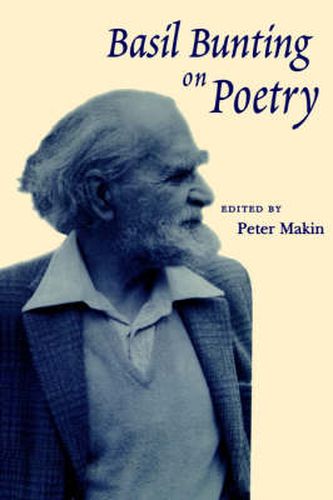Readings Newsletter
Become a Readings Member to make your shopping experience even easier.
Sign in or sign up for free!
You’re not far away from qualifying for FREE standard shipping within Australia
You’ve qualified for FREE standard shipping within Australia
The cart is loading…






All you can usually say about a poem or a picture is, ‘Look at it, listen to it.’ Whether you listen to a piece of music or a poem, or look at a picture or a jug or a piece of sculpture, what matters about it is not what it has in common with others of its kind, but what is singularly its own. -Basil Bunting A close poetic ally of Ezra Pound and Louis Zukofsky, the British poet Basil Bunting is best known for his use of specific musical form in poetry. Several of his works, including his long poem Briggflatts, are in the form of the sonata. Although his language is plain, unvarnished English, his influences and models extend to Classical, Persian, and Japanese verse. Basil Bunting on Poetry collects two series of lectures that Bunting delivered in 1968 and 1974. Tracing the development of an English poetry governed by families of stress-groups from Beowulf down to Wyatt, Wordsworth, Whitman, Pound, and Zukofsky, the lectures focus on writing and hearing poetry rather than on literary-historical concerns. Throughout, editor Peter Makin expands upon and annotates the lectures with additional comments drawn from Bunting’s writings.
$9.00 standard shipping within Australia
FREE standard shipping within Australia for orders over $100.00
Express & International shipping calculated at checkout
All you can usually say about a poem or a picture is, ‘Look at it, listen to it.’ Whether you listen to a piece of music or a poem, or look at a picture or a jug or a piece of sculpture, what matters about it is not what it has in common with others of its kind, but what is singularly its own. -Basil Bunting A close poetic ally of Ezra Pound and Louis Zukofsky, the British poet Basil Bunting is best known for his use of specific musical form in poetry. Several of his works, including his long poem Briggflatts, are in the form of the sonata. Although his language is plain, unvarnished English, his influences and models extend to Classical, Persian, and Japanese verse. Basil Bunting on Poetry collects two series of lectures that Bunting delivered in 1968 and 1974. Tracing the development of an English poetry governed by families of stress-groups from Beowulf down to Wyatt, Wordsworth, Whitman, Pound, and Zukofsky, the lectures focus on writing and hearing poetry rather than on literary-historical concerns. Throughout, editor Peter Makin expands upon and annotates the lectures with additional comments drawn from Bunting’s writings.